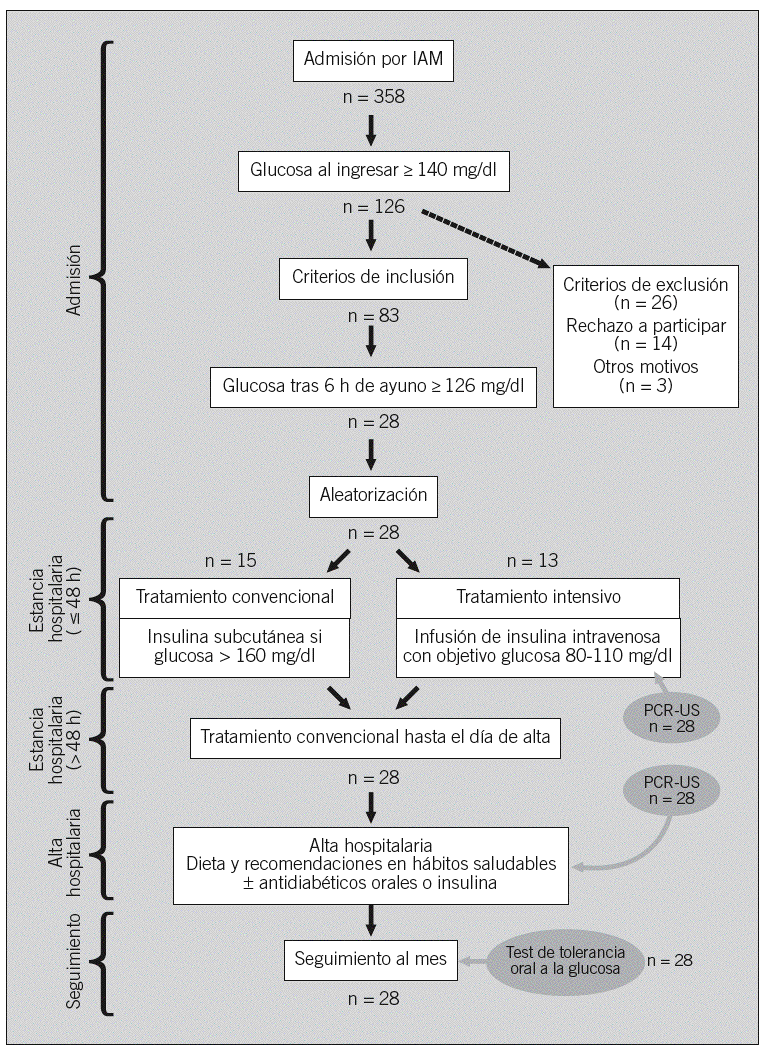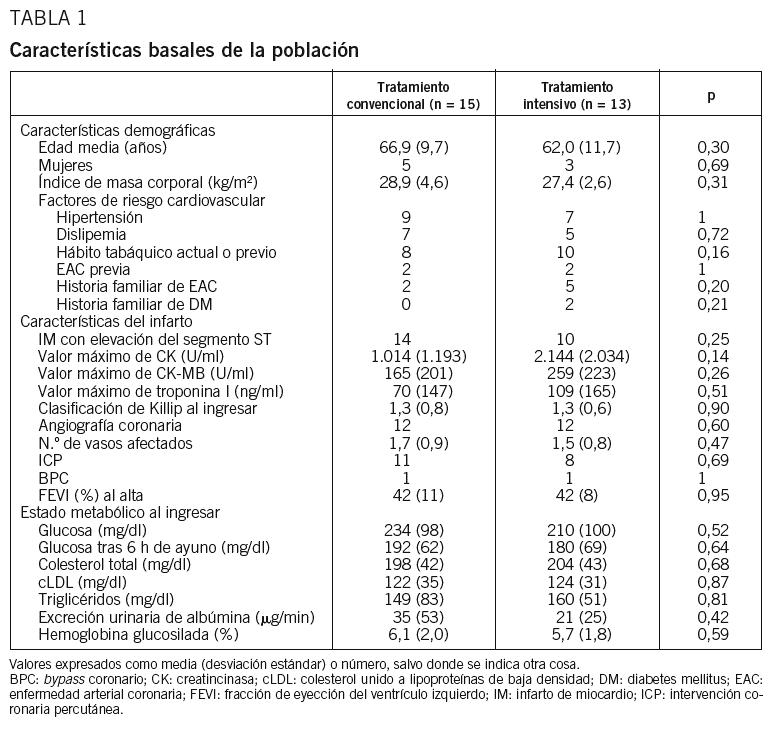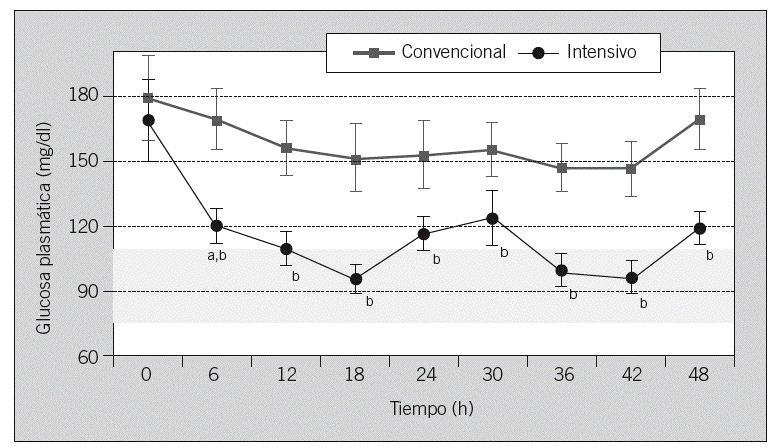Journal Information
Vol. 130. Issue 16.
Pages 601-605 (May 2008)
Vol. 130. Issue 16.
Pages 601-605 (May 2008)
DOI: 10.1157/13120338
Tratamiento intensivo con insulina en pacientes sin diabetes conocida con infarto de miocardio e hiperglucemia. Estudio INSUCOR
Intensive insulin therapy in non-diabetic patients with myocardial infarction and hyperglycemia. INSUCOR study
Visits
3068
Begoña Benitoa, Ignacio Congetb, Xavier Boscha, Magda Herasa, Jorge Ordóñezc, Álex Sionisa, Gonzalo Díazb, Enric Esmatjesb
a Servicio de Cardiología. Instituto Clínico del Tórax.
b Servicio de Endocrinología y Diabetes. Institut Clínic de Malalties Digestives i Metabòliques (ICMDiM). Hospital Clínic. Institut d'Investigacions Biomèdiques August Pi i Sunyer (IDIBAPS). Barcelona.
c Servicio de Bioquímica. Hospital de la Santa Creu i Sant Pau. Barcelona. España.
This item has received
Article information
Abstract
Full Text
Bibliography
Download PDF
Statistics
Tables (3)
Fig. 1. Representación esquemática del diseño del estudio INSUCOR. IM: infarto de miocardio; PCR-US: proteína C reactiva ultrasensible.
TABLA 1. Características basales de la población
Fig. 2. Glucosa plasmática durante las primeras 48 h de estancia hospitalaria. Datos expresados como media (desviación estándar). Las áreas sombreadas representan los valores de glucosa plasmática que se establecieron como objetivo en el grupo de tratamiento intensivo, definidos como óptimos. ap < 0,01 comparado con los valores basales en cada grupo mediante la prueba de los signos de Wilcoxon. bp < 0,05 para diferencias entre grupos mediante el test de ANOVA para medidas repetidas.
Show moreShow less
Fundamento y objetivo: La hiperglucemia en el momento del ingreso se ha asociado con mal pronóstico en pacientes con infarto de miocardio (IM). El beneficio clínico del tratamiento intensivo con insulina se ha evaluado en pacientes diabéticos ingresados en unidades de cuidados intensivos. Nuestro objetivo ha sido evaluar los efectos a corto plazo y la seguridad del control glucémico estricto en pacientes con IM e hiperglucemia sin diabetes conocida. Pacientes y método: Se aleatorizó a un total de 28 pacientes sin diabetes conocida que habían ingresado con IM e hiperglucemia a 2 grupos de tratamiento durante las primeras 48 h: a) grupo de tratamiento intensivo (n = 13), que recibió insulina intravenosa con el objetivo de mantener la glucemia entre 80 y 110 mg/dl, y b) grupo de tratamiento convencional (n = 15), que recibió insulina subcutánea sólo si la glucemia era mayor o igual a 160 mg/dl. La proteína C reactiva ultrasensible se determinó a las 48 h del ingreso y al alta. Se realizó un test de tolerancia oral a la glucosa al cabo de un mes. Resultados: Durante las primeras 48 h la glucemia fue significativamente menor en el grupo de tratamiento intensivo, con una media (desviación estándar) de 104 (8) mg/dl, frente a 153 (54) mg/dl en el grupo de tratamiento convencional (p = 0,002), sin episodios de hipoglucemias sintomáticas. A las 48 h la proteína C reactiva ultrasensible fue significativamente menor en el grupo de tratamiento intensivo que en el de tratamiento convencional media de 44,3 (35,7) y 20,3 (20,3) mg/ml, respectivamente (p = 0,04). Al cabo de 4 semanas sólo el 28,6% de los pacientes presentaba tolerancia normal a la glucosa. Conclusiones: El tratamiento intensivo con insulina con valores cercanos a la normoglucemia en pacientes no diabéticos con IM e hiperglucemia es factible, seguro y más efectivo que el tratamiento convencional. Además, atenúa la respuesta inflamatoria. El estudio confirma la alta prevalencia de alteraciones de la tolerancia a la glucosa no conocidas en pacientes con IM.
Palabras clave:
Infusión de insulina
Tratamiento intensivo
Infarto de miocardio
Hiperglucemia
Inflamación
Background and objective: Hyperglycemia at admission has been associated with bad prognosis in patients with myocardial infarction (MI). The clinical benefit of intensive insulin treatment has been evaluated in diabetic patients admitted to intensive care units. The aim of our study was to assess the short-term effects and the safety of strict glycemic control in subjects with MI and hyperglycemia without a previous history of diabetes. Patients and method: Twenty-eight non-previously diabetic patients admitted with MI and hyperglycemia were randomized to 2 treatment arms during the first 48 h: a) the intensive group (n = 13) received intravenous insulin with target glycemia levels of 80-110 mg/dl, and b) the conventional group (n = 15) received subcutaneous insulin only when glycemia was 160 mg/dl. High-sensitivity C-reactive protein was determined at 48 h and before discharge. An oral glucose tolerance test was performed after one month. Results: During the first 48 h, glycemia was significantly lower in the intensive than in the conventional group mean (standard deviation): 104 (8) and 153 (54) mg/dl, respectively (p = 0.002), without any clinically significanyt hypoglycemic episodes. At 48 h, high-sensitivity C-reactive protein was significantly lower in the intensive group 44.3 (35.7) and 20.3 (20.3) mg/ml, respectively (p = 0.04). After 4 weeks, only 28.6% of patients showed normal response in the oral glucose tolerance test. Conclusions: Intensive treatment with insulin to maintain near normoglycemia in non-diabetic patients with MI and hyperglycemia is feasible, safe and more effective than conventional treatment. In addition, it produces attenuation of inflammatory response. Our study also confirms the high prevalence of unknown abnormalities in glucose tolerance in subjects with MI.
Keywords:
Insulin infusion
Intensive treatment
Myocardial infarction
Hyperglycemia
Inflammation
These are the options to access the full texts of the publication Medicina Clínica
Subscriber
Subscribe
Purchase
Contact
Phone for subscriptions and reporting of errors
From Monday to Friday from 9 a.m. to 6 p.m. (GMT + 1) except for the months of July and August which will be from 9 a.m. to 3 p.m.
Calls from Spain
932 415 960
Calls from outside Spain
+34 932 415 960
E-mail









